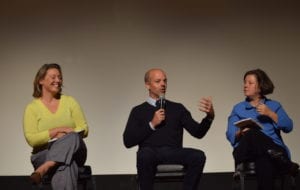Who is a member?
Our members are the local governments of Massachusetts and their elected and appointed leadership.

Sen. Adam Hinds (center) makes a point during the Massachusetts Selectmen’s Association’s Western Massachusetts Fall Conference on Oct. 5. Hinds was on a panel with Rep. Natalie Blais (left) and Sen. Jo Comerford (right) that discussed creative ways to attract people to western Massachusetts. They also discussed the region’s broadband internet and rail service needs.
Sharing municipal services requires detailed planning and careful thought, but can greatly benefit small towns that are trying to maximize limited resources.
This was the message from presenters on Oct. 5 during the Massachusetts Selectmen’s Association’s Western Massachusetts Fall Conference, which focused on the particular concerns and challenges faced by western communities.
The lineup included a presentation by several legislators and a keynote address by Housing and Economic Development Secretary Mike Kennealy. The conference’s breakout sessions focused on growth – growing partnerships, growing housing, growing revenue and growing the region’s population.
In the session on growing partnerships, regional planner Eric Weiss said small communities struggle to pay for what they need, even during times of strong state budgets and revenue. They need to collaborate now, he said, and that need will become even more pronounced during the next economic downturn.
“There is no doubt to anybody in this room that small towns need to talk to each other to get things done, and that small towns need to cooperate with each other to get things done,” said Weiss, who is the regional and municipal programs manager for the Pioneer Valley Planning Commission. “It can be as simple as mutual aid. It can be as complex as sharing services.”
Weiss cited several examples of municipal collaboration: the soon-to-be joint police force of Chester and Blandford, due to start on July 1; work on a regional roundtable examining the effects of solar technology on local communities; and preliminary talks among several towns – including Goshen, Chesterfield and Worthington – to share emergency services.
Bob Dean, regional services director for the Franklin Regional Council of Governments, said towns should seek new ways to share. He said towns can share resources to comply with state and federal mandates; bid collectively for services; consider sharing positions after a retirement or attrition; implement recommendations from regional plans; and start with low-risk sharing experiments before attempting larger endeavors such as regional school districts.
“Involve the key stakeholders in the process,” Dean said. “If those who are making the decisions are not on board, don’t even waste your time, because it’s not going to happen.”
Blandford Town Administrator Joshua Garcia said small towns should take advantage of every resource available, since they lack economies of scale but are held to the same standards as larger communities. As his town heads toward its July 1 police agreement with Chester, he said towns contemplating shared services need to look at the realities of their situations.
“You get what you plan for,” Garcia said. “Every scenario is different.”
Williamstown Town Manager Jason Hoch, whose community has collaborated with neighboring towns on services including assessing and community development, said officials who collaborate need to “be patient” and find ways to balance their communities’ needs with fidelity to the sharing agreements.
“Try it, set a decent foundation, and leave yourself the space to revisit it,” Hoch said of sharing agreements. “Because there are some things you can’t plan.”
The conference, held at UMass Amherst, included a panel discussion with Sens. Eric Lesser, Jo Comerford and Adam Hinds, and Rep. Natalie Blais, as well as opening remarks from Rep. Mindy Domb and a presentation from Rep. Paul Mark.
Attendees also discussed the Rural Policy Advisory Commission Plan, the need to bring broadband internet service to all communities, the region’s rail service needs, and the problems of declining population and a workforce skills gap.
The MSA partnered with the Berkshire County Selectmen’s Association, the Franklin County Selectmen’s Association, the Berkshire Regional Planning Commission, the Franklin Regional Council of Governments and the Pioneer Valley Planning Commission to hold the conference.